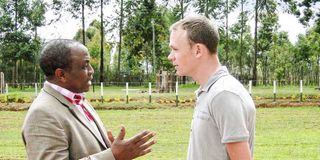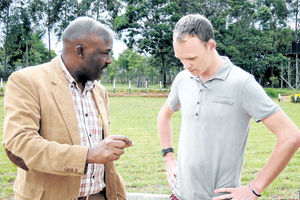
Kenya Cycling Federation boss Julius Mwangi chats with 2013 Tour de France champion, Christopher Froome at Kip Keino School in Eldoret on November 11, 2013.
The demise of Julius Mwangi popularly known as “Kamaliza” on Monday morning marks the end of era for man who took up Kenyan cycling leadership in his late 20s and went on to define the path of the sport from amateur to the professional status it has today.
Mwangi, was Kenya Cycling Federation chairman for 40 years. He succeeded Jacob Wawire in 1984, aged 35. At that time Mwangi was the chairman of the KCF Eldoret Branch.
Not long after, Kamaliza started organising cycling races in Eldoret and Bungoma influenced by the Gitonga Family, the pioneer cycle mart dealers in north Rift and parts of Western.
Mwangi had also noticed a queer culture in that part of Kenya where all national celebrations ended with football matches.
But but before the matches were played, fans who had come with bicycles would race on the running track with winners being rewarded with tyre pumps, tyres and tubes.
Cycling was big and he grew his influence in this region
But cracking Nairobi and the established order in cycling management was not going to be easy for Mwangi, a former policeman, who teamed up with Charles Mose as the federation secretary and they gradually took over the management of cycling thanks to his security firm, Kamaliza Security Guards.
You see, Mwangi managed to establish many Kamaliza Security Guards offices and regional KCA branches, at first as clubs, in western Kenya.
He influenced many of his employees to buy bicycles -- the preferred means of travel then, and become members of the KCA clubs and branches.
While these branches served him well to remain in management for all those years, he will be remembered as the man who contributed immensely to the growth of the Boda Boda industry especially in Western Kenya that produced several national calibre cyclists like Waithaka Gitonga, Patrick Maina, and later Kimani Macharia and John Runana of Nakuru.
It was also under him that Kenya’s long-time professional David Kinja, John Mwangi, Arthur Kamau, Mathew Maina, Dennis Wagana and Kenyan-turned multiple Grand Tours winner Briton Chris Froome, emerged.
KCF were then operating in one of the tiny cubicles at Nyayo National Stadium the government gave national sports federations. However, Mwangi’s brand was felt far and wide.
He became quite a star during the fourth All African Games in Nairobi as the principal marshal in the lead car during the time trial race around the city’s CBD when he lectured the revered KBC radio broadcasters for misleading thousands of fans following the action on radio for their lack of knowledge on the race which they declared finished at the halfway stage.
Mwangi went on to rival all the big established security firms in the north Rift and Western Kenya where Kamaliza was the market leader and developed cycling in the region thanks to the firm’s headquarters being in Eldoret and Mwangi being based there.
Mwangi had been a police inspector posted to several regions in Western where he noticed a vast opportunity for security services.
Although he was from Kandara, Muranga, County, he chose Eldoret as his base and soon made friends with prominent locals including the Gitonga family.
But cycling never grew as expected with many established races like the Ndeiya Open and Uvumbuzi Nairobi-Magadi road races either dying or petering to low key events.
Mwangi’s footprint of cycling in Eldoret was retraced and revived last year during the Africa Cycling Championships in the streets of Eldoret and adjacent areas.
These championships were well organised by sports management firm Golazo, the county government of Uasin Gishu and KCF. Nonetheless, a Mwangi’s touch would have been felt profoundly if he was not ailing.
He passed on at Nairobi Hospital on Monday, aged 75.






